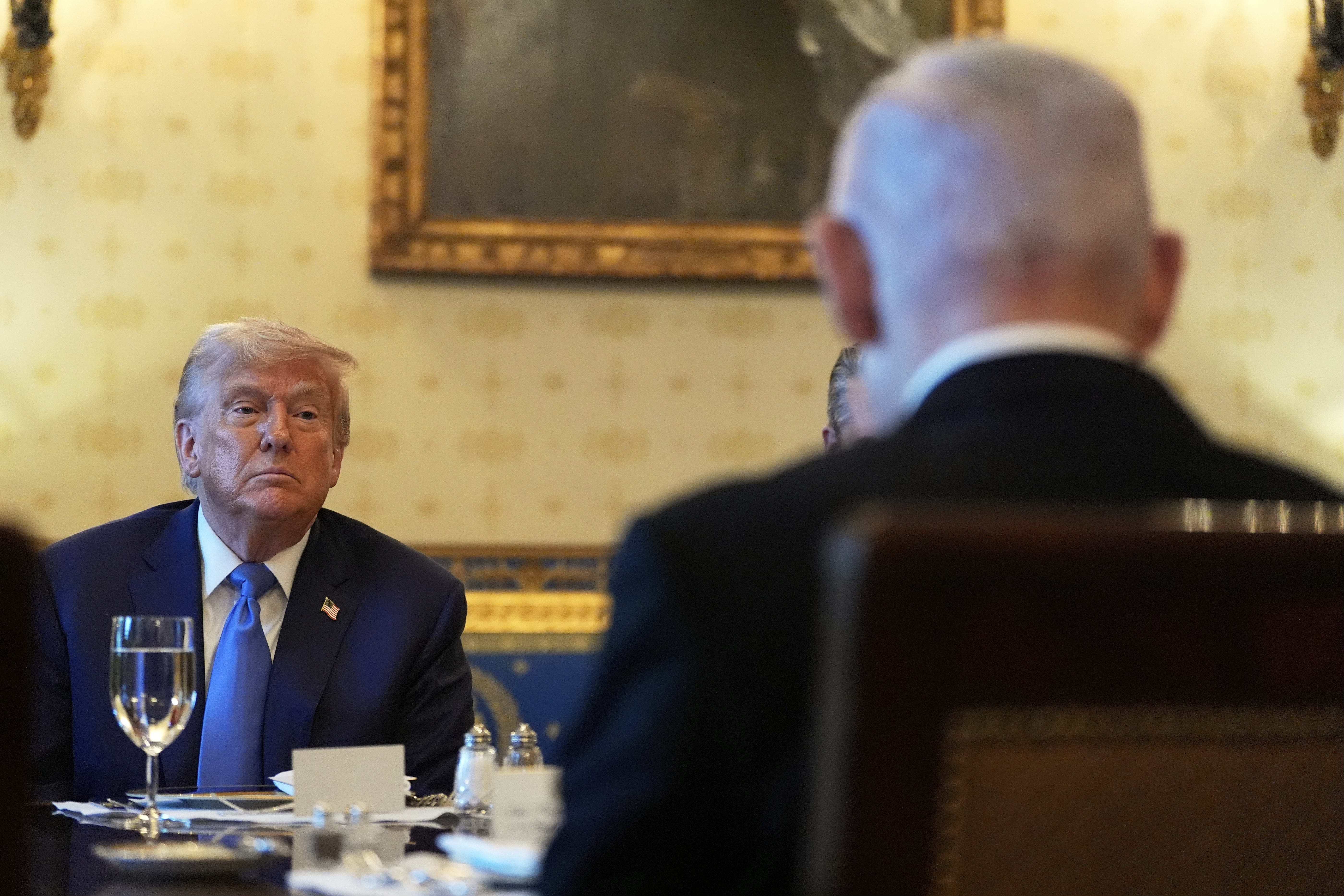Netanyahu, Trump news conference - live updates
12:43 p.m. The press conference has ended.
12:38 p.m. Mr. Trump began to talk about his Electoral College win again.
Netanyahu said that the issue of settlements is “not the core of the conflict, nor does it drive the conflict” when asked what he thinks about Mr. Trump’s call for him to halt their construction.
The prime minister said that he’s known the president and his team for “a long time.”
A reporter yelled out a question about reports about Russian contact with his team, but Mr. Trump ended the press conference.
12:33 p.m. The president said that the Israelis are going to have to show new flexibility if they want to achieve a peace agreement. He said there’s “no way” a deal can be made if they can’t acknowledge Israel’s existence.
12:28 p.m. Mr. Trump said he’s open to a two-state or one-state solution as part of a peace deal.
“I like the one that both parties like,” he said. “I can live with either one.”
As far as his promise to relocate the U.S. embassy in Israel from Tel Aviv to Jerusalem, Mr. Trump said, “I’d love to see that happen. We’re looking at it very, very strongly. We’re looking at it with great care.”
Netanyahu said that there are two prerequisites for a peace agreement with the Palestinians, which is that they must recognize the Jewish state and that Israel must be able to keep security control of the West Bank. The prime minister is the reason why they don’t have peace is because Palestinians consistently call for the destruction of Israel.
Netanyahu said that he’s interested in a “regional approach from involving our newfound Arab partners in pursuit of a broader peace and peace with the Palestinians.”
12:23 p.m. Both leaders were asked about their positions on Iran, Flynn and their positions on West Bank settlements. Mr. Trump called Flynn, who resigned as his national security adviser on Monday night, wonderful and that he was treated “very, very unfairly by the media,” which he then called “the fake media.”
The president said that he asks Israel to “hold back on settlements for a little bit.”
Netanyahu said, “We’ll try,” and Mr. Trump said that didn’t sound too optimistic.
12:20 p.m. Netanyahu thanked Mr. Trump for the ‘truly warm hospitality” and said, “I deeply value your friendship.”
“Israel has no better ally than the United States and I want to assure you that the United States has no better ally than Israel. Our alliance has been remarkably strong, but under your leadership, I’m confident it will get even strong,” the prime minister said.
Netanyahu said he hopes to work closely with the U.S. on enhanced security and cyber programs.
He said that both of their nations are under attack “by radical Islamic terror” and that Mr. Trump has shown great courage in confronting that problem.
“Under your leadership, I believe we can reverse the rising tide of radical Islam...Israel stands with you and I stand with you,” Netanyahu said.
12:15 p.m. The president said he has welcomed his “friend” Netanyahu to the White House. He said his visit represents their nations’ “unbreakable bond” and that their shared values have advanced freedom and peace.
“The state of Israel is a symbol to the world of resilience in the face of oppression,” Mr. Trump said. “We will never forget what the Jewish people have endured.”
The president said that the security challenges Israel faces are “enormous” including Iran’s nuclear ambitions, calling the nuclear deal “one of the worst deals” he’s ever seen.
“Our security assistance to Israel is currently at an all-time high,” he said. “We have a long history of cooperation in the fight against terrorism and the fight against those who don’t cherish human life.”
Mr. Trump said that the U.S. rejects one-sided actions by the United Nations against Israel as well as boycotts against Israel. He expressed his desire to work toward a peace agreement between the Israelis and Palestinians. The president made it clear that both parties must the ones who negotiate and that both sides must make compromises.
12:00 p.m. A joint press conference between President Trump and Israeli Prime Minister Benjamin Netanyahu is scheduled to begin at the White House. The event is a bit unusual because unlike other visits from foreign leaders, the news conference will precede their bilateral meetings, taking place just minutes after Netanyahu is scheduled to arrive.
The visit is critical for reinvigorating the U.S.-Israel relationship, which experienced some low points under President Obama including in December when the Obama administration abstained during a U.N. Security Council vote on a resolution that demanded an end to Israeli settlement construction.
A senior White House official told reporters on the eve of the visit that the administration might not pursue a two-state solution as part of its efforts to facilitate a peace agreement between the Israelis and Palestinians.
In response, a member of the Palestine Liberation Organization’s executive committee warned that if the White House decides to not pursue a two-solution between Israel and the Palestinians, then it would doom chances for Middle East peace.
“If the Trump Administration rejects this policy it would be destroying the chances for peace and undermining American interests, standing and credibility abroad,” Hanan Ashrawi said in a statement.



